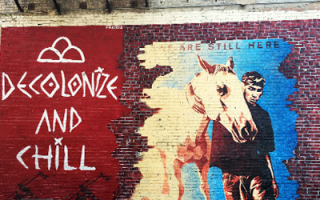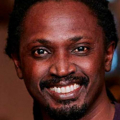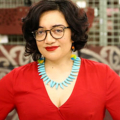ICCROM 31st General Assembly 2019
There are so very many remnants of colonial times: from street names and statues that glorify people responsible for massacre and genocide, to objects in museums taken from their original owners, to the human remains of unidentified people held as collection artefacts.
There is so much missing in our museums and cultural institutions: histories, stories and traditions of indigenous people and communities, their knowledge of collections and objects.
Coloniality is in many different ways more present than past.
In past years, a growing number of cultural institutions, archives, museums across Europe, Northern America, Australia, are trying to tackle the challenge of decolonizing their institutions. They are aware that the collections they present and research often have a colonial or even racist background.
Seeing these developments and the impact of this movement the Council of ICCROM has decided to dedicate the Thematic Discussion during the ICCROM 31st General Assembly of 2019 to “Decolonizing Heritage”.
Initially, decolonization referred to the process that former colonies underwent to free themselves of the colonial supremacy. Today the term has become much more than that: a philosophical, moral, social, spiritual and also activist call that points to the fact that we are still subject to the ideology of colonialism.
Decolonizing is about questioning our institutions: how and why are some forms of knowledge given priority and authority over others? How do we organize and categorize knowledge? Who determines the selection and quality criteria of collections? Who decides what is presented and represented? How do we contribute to a renewal of the canon with stories and reference frames that have been systematically erased from it?
In short: how do we change the focus, how do we alter our perspective?
Decolonizing is about difficult conversations and reflections on the meaning of cultural institutions and who these institutions are intended to serve. It is about open and true dialogue with all members of communities and society, it is about sharing power and authority.
Decolonizing is about cultural institutions becoming learning communities. About the necessity to create room for multiple perspectives showing the different contexts that determine how we look at objects or themes.
Four invited speakers, Dr. Wayne Modest, Dr. Shahid Vawda, Puawai Cairns and Dr. Sarah Pash, will present their views on these challenges, and how communities and other stakeholders can work together to confront historic injustices and ongoing inequalities, and promote the emergence of decolonial heritage practices.
Speakers Statements
From Conservation to Care: Rethinking Conservation in the Age of Decolonisation
Wayne Modest
For many in the museum world, the terms conservation and care form a logical pair. Indeed, these terms are often used together to describe museum practices (and departments) aimed at the preservation of collections. Care, in this sense, is concerned with the measures and conditions established to prevent or limit the deterioration of museum/heritage objects and thus to preserve them for the future.
Thinking from feminist and queer (activist) perspectives, this presentation explores care not as a logical couplet for conservation, but as a future-oriented horizon for imagining what conservation can become in times of decolonisation. My presentation coincides with recent demands from diverse movements globally to decolonise museums. These demands, emergent mostly from activists outside museums themselves, have focussed mainly on curatorial or interpretive practices within museums, or on museums’ engagement with diverse stakeholder communities, especially in learning and outreach programmes. Increasingly, such critique has also focused on how museums confront their relationship with the colonial past, and concomitantly how they deal with the objects in their collections acquired during the colonial period. I will argue that, in contrast, relatively little attention has been given to “decolonising conservation”.
I will take ICCROM and ICOM, both part of what might be called the structure of global heritage governance, as starting points to think through what might be needed to decolonise conservation, and to transform it into a decolonial practice of care. My presentation will not solely be theoretical in approach. Rather, I engage with some of the practical concerns that I faced working for over a decade in the museum/heritage sector in the Caribbean, asking what is at stake in (global) heritage governance, especially mindful of former colonial relations and colonial durabilities in the present.
Pursuing Decoloniality through Cultural Heritage: Knowledge, Injustice and Practices
Shahid Vawda
In this address to the ICCROM General Assembly I want to pose the question of how in the post-colonial era do we recognize and resolve injustices in and through cultural heritage. I am particularly interested in injustices that rest on knowledges, or lack of knowledges, and current practices that have entanglements or connections from historical antecedents in a pre and colonial past. The present, I contend, must be understood as coloniality, rather than a post-colonial linear development from colonialism.
To answer this question there are two issues that need to be addressed. Firstly, how did the present emerge on a world-wide scale, recognizing the complex, often ‘unseen’ ways in which we understand ‘western rationality’ as the culture of modernity. And how this modernity was, and is, imposed, resisted, assimilated and accommodated. What were and are the conceptual tools or knowledge deployed to this task? While this means providing an outline of the colonial situation, I want to suggest that we need to fundamentally re-think colonialism and how its imprint continues and is sustained world-wide in the cultural heritage sector. This indelible imprint in the cultural heritage sector, I suggest, is most keenly felt in the developing world as an epistemological injustice, rather than simply physical violence. It arises from colonial and in post-colonial situations where experts, officials and leaders often disregard the varying interlocutors by ignoring, silencing, playing down, or obscuring their knowledge, voices and actions. It also has equally strong echoes in the developed world.
The second issue is how to address the colonial imprint, i.e. continuities and discontinuities of colonial frames of reference and the precolonial traces that identify people, nations and states as progression, or its lack, towards modernity. Despite significant universal progress in terms of recognition of diversity, cultural differences, intangible heritage, national and indigenous autonomies and advances in living standards, cultural heritage as a set of practices has had inconsistent and contradictory outcomes. It requires cultural heritage institutions to reflect and think about artefacts and sites, within disparities and inequalities of wealth, poverty and power, and to ask questions as who shapes the meanings of how we think, talk and write and implement plans to conserve, preserve, display and inaugurate cultural heritage practices. I suggest that the primary framework for this has been limited to the European Renaissance and Enlightenment that claims to embody the world’s universal ideals, and that to address these challenges of cultural heritage requires a broad decolonial perspective that incubates a whole new era infinitely more consistent with the universal rights of people embodied in the United Nations founding charter.
Decolonisation or indigenisation. Nourishing museums through indigenisation
Puawai Cairns
Museums suffer from a chronic inherited condition called colonisation. It affects every part of their body and the bodies they come in contact with. And they are increasingly asking indigenous people to medicate its painful aging symptoms in a process the museums are calling decolonisation. But what happens when that prescription is contrary to what indigenous people may see as the most appropriate corrective measure for them and for the museum, a process of transformation through indigenisation?
In my work in the national museum of New Zealand Te Papa Tongarewa, I work as an advocate for Māorification of museology within a bicultural framework informed by New Zealand’s founding document, the Treaty of Waitangi. This presentation will give an overview into some of the ‘Māorified’ responses to museology that can be seen in Te Papa, and while they can be argued are examples of decolonial practices, I view them as an indigenised mode of working. I see indigenisation as a process of caring for and nourishing, composting the ground upon which the museum is built so that Māori aspirations are given a fertile ground to grow and to support the future bicultural well-being of the museum and the Māori communities that surround it.
An Eeyou Approach to Heritage
Sarah Pash
Working from the conviction that Indigenous Heritage is a right that must be authentically exercised, the Cree Nation of Eeyou Istchee has developed its own vehicles for maintenance of culture and language to ensure that Eeyou heritage is accessible for generations to come. Much development has been due to the treaty the Cree Nation of Eeyou Istchee negotiated with Canada and the Province of Quebec; the James Bay and Northern Quebec Agreement, a modern-day agreement, which, among other foundational initiatives, ensures the development of institutions necessary to exercising self-determination in heritage management, and initiatives necessary for maintenance of culture and language. Over the past 40 years, this Indigenous nation has developed its own school board with power to determine programming related to Cree culture and language maintenance, the language of instruction, and history and citizenship curriculum. In addition, the Cree Nation of Eeyou Istchee created Aanischaaukamikw, the Cree Cultural Institute, a regional organization serving the communities and people of Eeyou Istchee. This cultural institute is mandated with ensuring that Cree culture is practised and celebrated, that both tangible and intangible heritage are maintained, and that the language lives in strength for generations to come. Other regional associations related to the practice and maintenance of culture and tradition support the ability to carry on the traditional hunting and trapping lifestyle living in-relation and respect with the land, the ability to perpetuate the practice of traditional arts and crafts, and the ability to ensure occupation and use of the territory. We are the people of the land, the Eeyou of Eeyou Istchee. Our relationship with the land, defines who we are; who we are, our identity as Eeyouch, defines the way in which we approach heritage management. Dr. Sarah Pash will speak about how the Cree Nation of Eeyou Istchee has approached heritage management from a strong, self-determining stance and explore concepts of reconciliation and decolonizing heritage management practices from this perspective.
-----------------------------------------------
The Speakers
Prof. Wayne Modest
Research Center of Material Culture, Vrije Universiteit, Amsterdam, Netherlands
Wayne Modest is head of the Research Center for Material Culture, the research institute of the Tropenmuseum, Museum Volkenkunde, Africa Museum and the Wereldmuseum in the Netherlands. He is also Professor of Material Culture and Critical Heritage Studies in the Department of Humanities at the Vrije Universiteit, Amsterdam. He was previously Head of the Curatorial Department at the Tropenmuseum, Keeper of Anthropology at the Horniman Museum in London, and Director of the Museums of History and Ethnography at the Institute of Jamaica, Kingston Jamaica. Modest started his museum work in conservation.
Prof. Shahid Vawda
Archie Mafeje Chair in Critical and Decolonial Humanities, University of Cape Town, South Africa
Shahid Vawda graduated from the universities of Durban-Westville (BA), Queens (Belfast)(MA) and KwaZulu-Natal (PhD). Before taking up academic positions in South Africa he worked in the trade union movement and at the educational NGO, the SACHED Trust in the 1980s, and as consultant researcher for the post-1994 local, provincial and national governments (land reform, housing, informal settlements, forestry re-structuring and heritage). His academic teaching and research has been at various universities in South Africa, some African countries and abroad, including participation in some UNESCO and International Council of Museums (ICOM) research workshops related to culture, heritage and diversity. He held positions as head of the Departments of Anthropology at the Universities of Durban-Westville and Witwatersrand, and was the Head of the School of Social Science at the University of Witwatersrand from 2012-2017. He has been active on the boards of the International Council of Museums committee for history and archaeology (ICMAH), and the local South Africa ICOM committee, the Public Affairs Research Institute, Centre for Critical Diversity Studies, African Centre for Migration and Society and the Wits Institute for Social and Economic Research. He has published widely in journals and books, and has been credited with many research reports. Currently he holds the Archie Mafeje Chair in Critical Decolonial Humanities and the directorship of the School of African and Gender Studies, Anthropology and Linguistics at the University of Cape Town.
Puawai Cairns
Kaihāpai Mātauranga Māori | Head of Mātauranga Māori, Te Papa Tongarewa Museum, Auckland, New Zealand
Puawai Cairns manages the Māori curatorial team and is an advocate for Mātauranga Māori across museum spaces. She specialises in contemporary social history research and collecting to reflect the stories of Māori communities. Puawai is presently exploring what the concept mana motuhake looks like in museology and exhibition making, and is especially interested in indigenising museum practice.
Iwi affiliation: Ngāti Pūkenga, Ngāti Ranginui, Ngāi Te Rangi
Dr. Sarah Pash
Executive Director, Aanischaaukamikw Cree Cultural Institute, Canada
Dr. Sarah Pash, a member of the Cree Nation of Chisasibi in northern Quebec, is currently the Chairperson of the Cree School Board, an indigenous-run authority. She has worked throughout her career in the fields of education, and culture and heritage. Recently, she was the Executive Director of Aanischaaukamikw, the regional Cree Cultural Institute for Eeyou Istchee. She joined the Cree Cultural Institute when it opened in 2011 as Director of Programs, assisting in the organizational development of the Institute with her experience in program development and implementation, indigenous research, and public sector planning and management. Sarah has a background in First Nations education, culture and language maintenance, as a teacher, university instructor, education consultant, research coordinator, and author. Her community service includes terms as a band councilor in her community’s governance system, and board member on various First Nations community organizations. She is on the Board of Directors of the Canadian Museums Association, on the Indigenous Heritage Issues Council for the Canadian Museums Association, and a board member on the Indigenous Heritage Circle, a national board in Canada that brings together expertise and communities from across the country. Sarah holds a B. A. (Hons.), a B.Ed. and M.Ed., a PhD. in education, and a Master’s Certificate in Public Organization Management.






